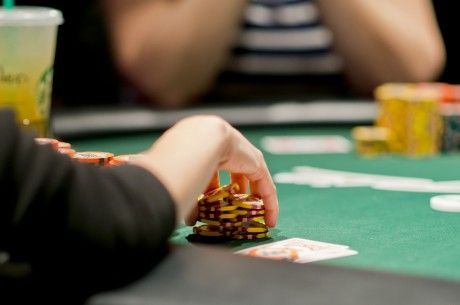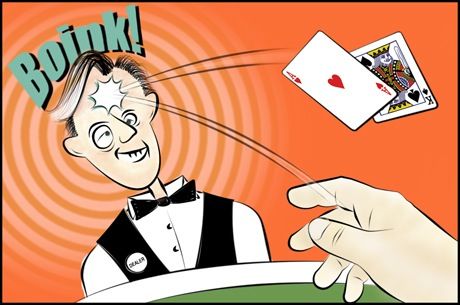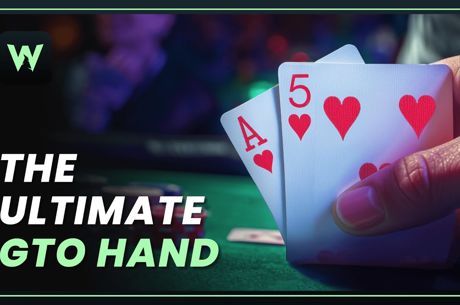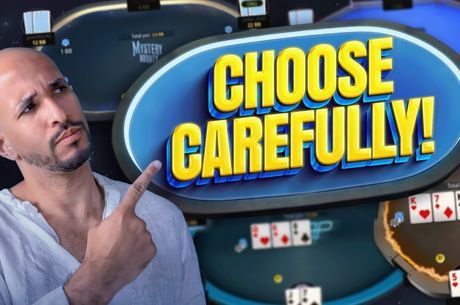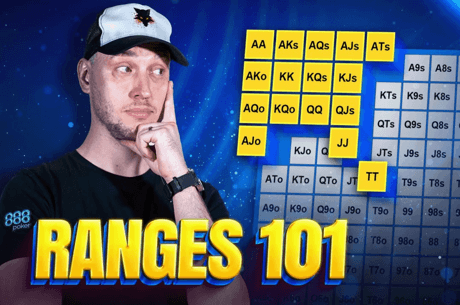Sitting With Elephants; or, How to Play Against Calling Stations

Early in Phil Hellmuth’s Play Poker Like the Pros, he includes a list of player types, identifying particular playing styles by assigning different animals to them. For those who read Play Poker Like the Pros back in the day — for a lot of players getting started then, it was the first (or only) strategy book they ever read — it was probably the most memorable part of the book.
While the list of animals might be of limited value — the eagle “flies around high in the sky and swoops down to eat other animals’ chips” (?) — one of the more appropriate types included is the elephant, the animal Hellmuth assigned as representative of the calling station.
The elephant “never folds when he is supposed to fold” and is “impossible to bluff,” he writes, joking that the elephant is usually from Missouri because that’s the “Show Me” state. Essentially he’s hard to move off a hand — like a calling station.
The “Calling Station”
Generally whenever a player is referred to as a “calling station” it is never complimentary. Sometimes you’ll hear a player refer to himself self-deprecatingly as a “calling station” when recounting a hand, perhaps adding the disclaimer “I’m not good enough to fold there.” But usually it’s a derogatory term used to describe a particularly unimaginative “loose-passive” player.
The “calling station” is loose because he plays lots of hands, more than the average (and probably more than he should). He is passive because he rarely opens with bets or raises others’ bets, but instead is content to call repeatedly, often remaining in hands all of the way to the showdown.
Low-stakes games commonly are inhabited by calling stations, both online and live. Some in those games are encouraged to keep calling bets thanks to the low limits. In live poker, you’ll find lots of novice players wanting to keep calling simply because it is more fun to remain in a hand than not to. “I didn’t come here to fold!” you’ll hear them say.
Value Betting
In “Dealing With Hyper-Aggressive Opponents,” Josh Cahlik recommends a strategy for playing against loose-aggressive players that involves tightening up, practicing patience, and setting traps in order to get paid off with big hands. Along the way Josh describes a hand in which he made a monster (turning the nut flush), but only made a small turn bet and then checked the river, letting his aggressive opponent make a big river shove and then calling to win a nice pot.
Against a calling station, you also need to practice patience and set traps. However, unlike with aggressive opponents, against calling stations you’ll need to be taking the initiative by betting your made hands yourself, not waiting for them to bet against you.
Indeed, against calling stations it is important to learn how to get comfortable making the value bet. Unlike a bluff, a value bet is made with the hopes of getting a call. Against the hyper-aggressive opponent, Josh knew he didn’t need to make a value bet on the river with his nut flush as his opponent would be firing away after he checked. But against a calling station, you’ll want to be betting strong hands.
Against calling stations you’ll also want to get in the habit of value betting medium-strength hands. In fact, those will be the hands in which you’re likely to derive the most profit against such opponents.
Say you open-raise with A♦Q♦ from late position, the calling station calls from the big blind, then the flop comes Q♠8♦4♣. When he checks, you should bet. His range is very wide (as usual) and includes many hands with which he’ll call, including lesser queens, hands containing eights or fours, gutshot straight draws, and more. Don’t slow play versus calling stations.
The turn then brings the K♣ and he checks again. Bet again. The king may have hit his hand, but again the loose-passive player’s range remains wide enough to include many hands with which he’ll call that you still beat.
If the river brings a straight-completing card, a third club, or some other scare card, you may decide to check behind when he checks a third time — a perfectly valid choice as your hand has showdown value.
However, consider this — the surprise check-raise on the river is often not going to be a move in the calling station’s repertoire. If he checks you may still want to check behind depending on what the river has brought, because if he has made a better hand he’ll call you and you’ll lose more chips as a result. But don’t dismiss the idea of value betting the river here, too, against such an opponent. You don’t have to make the nuts to win chips from the elephant.
Avoid Bluffing
The calling station can be frustrating to play against because you do generally need to make hands to win against him, and making hands can be difficult.
But the range of made hands with which you can profit against such a player is wide. You don’t need the strongest possible hand to get paid, and even medium-strength hands like second pair (or even worse) can be worth betting, because the range of hands with which he’ll call will include many lesser-strength hands (lots of draws before the river, bottom pair, even ace-high).

Because of the player’s tendency to keep calling you, bluffing is generally not going to be a suggested move against the calling station. There are spots when it is in fact possible to bluff such a player — in tournaments, for instance, when calling you would require the last of such a player’s chips, a well-timed bluff can force a fold.
But the calling station is generally always looking for a reason to call you, so bluffing is often not going to be recommended.
Conclusion
Like any player who does one thing too much, the calling station has a style that is exploitable. Value betting medium-to-strong hands is a primary way to exploit such players, as is avoiding non-straightforward plays (e.g., trying to check-raise, slow play, bluff, etc.).
And don’t exert too much energy trying to push these “elephants” off their hands. It’ll just make you sore.
Photo “” by Stickophobe;
Get all the latest PokerNews updates on your social media outlets. on Twitter and find us on both and !


